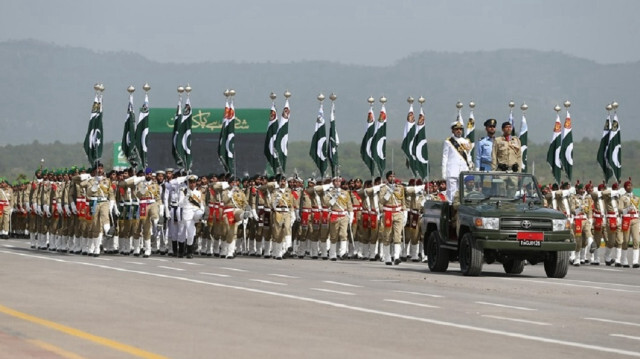
Traditional military parade rescheduled for March 25 due to inclement weather in capital Islamabad
Pakistanis on Thursday celebrated their Republic Day amid a deepening political turmoil and a tottering economy.
The day dawned with a 31-gun salute in Islamabad and a 21-gun salute in each of the four provincial capitals, followed by change-of-guards ceremonies at the mausoleums of Quaid-i-Azam Mohammad Ali Jinnah, the South Asian nation’s founder, in the port city of Karachi, and Allama Mohammad Iqbal, the national poet, in the northeastern city of Lahore.
A military parade, which had been a highlight of the day, has been rescheduled for March 25 due to inclement weather, state-run Pakistan Television reported.
The day commemorates the adoption of the independence resolution -- commonly known as the Pakistan Resolution -- in Lahore in 1940, which demanded for the first time an independent state comprised of Muslim-majority states in then-United India under British colonial rule.
The adoption of the landmark resolution subsequently led to the creation of Pakistan on Aug. 14, 1947, bringing an end to over 150 years of British colonial rule.
Similar ceremonies were also held in Pakistan-administered Kashmir, according to Pakistan Television reported.
Separate ceremonies were held at the President's House and the four governor houses to give away medals and awards to local and foreign nationals for their outstanding services in various fields, as well as to strengthen ties between Pakistan and their respective countries.
President Arif Alvi and Prime Minister Shehbaz Sharif in their congratulatory messages to the people paid homage to the country's founding fathers for their "political wisdom, sagacity and determination to wage a relentless struggle for a separate homeland."
Alvi, in his message, recalled how the country established state institutions, made its defense impregnable, achieved nuclear deterrence, curbed terrorism, overcame the COVID-19 pandemic, and displayed the spirit of sacrifice and cooperation in the face of natural calamities.
However, he said, “we still have a long way to go to ensure the rule of law, strengthen democracy, reduce inequalities in our society, empower women, provide the rights of persons with disabilities, eradicate terrorism and extremism, ensure the political and economic stability of the country, and protect the human rights of our citizens.”
“The persecution of minorities, especially the Muslims in India, the rising wave of violence against Muslims, the violation of human rights, and the brutalities being committed by the Indian security forces in the Indian-occupied Jammu and Kashmir proved that the Muslim leadership of that time made a prudent decision,” he claimed.
Felicitating the nation, Sharif said the day serves as a reminder that, no matter what the challenges, human will is capable of achieving the impossible. “On 23rd March today, let us awaken the spirit of service to the nation,” he added.

